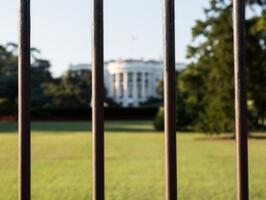Voters Not Convinced Obama Wasn’t In On Trump Spying
Voters are split on whether President Barack Obama or his inner circle were aware that U.S. intelligence agencies were spying on Donald Trump’s campaign, but they don’t believe Obama officials leaked names picked up in the surveillance efforts to the media.
A new Rasmussen Reports national telephone and online survey finds that 47% of Likely U.S. Voters think it’s at least somewhat likely Obama or his top aides were aware that the nation's intelligence agencies were spying on the Trump campaign and the Trump transition team, including 32% who believe it’s Very Likely. But 42% don’t think it’s likely, with 27% who say it’s Not at All Likely. (To see survey question wording, click here.)
A third of voters (33%) say senior members of the Obama administration spread secretly obtained information about the incoming president and his team to members of the media. Roughly half (48%) of voters, however, disagree with that assertion. Another 19% are not sure.
There is a strong partisan gap on both questions. Among Republican voters, 73% say Obama and his inner circle were aware of the spying on Trump officials, and 59% of those voters believe secretly obtained information was leaked to the press. Most Democrats disagree with both of those statements. Voters not affiliated with either political party are more evenly divided on both questions.
Several news agencies reported last week that the former national security adviser to Obama, Susan Rice, ordered U.S. spy agencies to produce spreadsheets revealing Trump associates picked up in surveillance of foreign officials and then leaked the names. Rice denied those allegations in an interview with MSNBC.
(Want a free daily e-mail update? If it's in the news, it's in our polls). Rasmussen Reports updates are also available on Twitter or Facebook.
The national survey of 1,000 Likely U.S. Voters was conducted on April 5-6, 2017 by Rasmussen Reports. The margin of sampling error is +/- 3 percentage points with a 95% level of confidence. Fieldwork for all Rasmussen Reports surveys is conducted by Pulse Opinion Research, LLC. See methodology.
Leaking the names of any Americans revealed in surveillance efforts could be a crime, but just 27% think it's at least somewhat likely criminal charges will be brought against any government employees for spreading secretly obtained information about Trump and his team to the media. Sixty-six percent (66%) say it’s not likely criminal charges will be filed against government employees. These figures include 11% who say it’s Very Likely and 28% who say it’s Not at All Likely that charges will be filed.
Most voters across the partisan spectrum agree that charges won’t be filed against government employees for the alleged leaks. In fact, most voters across the demographic board agree with that assessment.
Half of white voters (50%) and 46% of other minority voters think it’s likely Obama and his top aides were aware of U.S. intelligence agencies spying on the Trump campaign and his transition team, a view shared by just 32% of blacks.
Seventy-one percent (71%) of black voters think senior members of the Obama administration did not leak secretly obtained information. White voters are more evenly divided: 44% say no, while 37% say yes.
Men feel slightly more strongly than women that it’s likely Obama and his top aides were aware of the spying. Men are also a bit more likely to think senior members of the administration deliberately spread secretly obtained information about Trump and his team.
Those voters who feel it’s likely Obama and his officials had knowledge of spying on Trump officials also believe the information obtained in the exchanges with Trump and foreign officials was leaked to the media. Those who don’t think it’s likely the Obama team was aware of the spying also don’t think that information was given to the press.
A majority (53%) of all voters don’t believe it’s likely that the Obama administration tapped telephones in Trump Tower during last year’s presidential campaign, but almost as many (44%) think it’s likely the phones were bugged.
Forty-seven (47%) believe America’s intelligence agencies have their own political agenda. Thirty-nine percent (39%) disagree and think they perform impartially. Still, most voters give intelligence agencies positive marks for their overall performance.
Following numerous leaks earlier this year of secret information intended to embarrass President Trump to the news media, most voters said the leakers should be punished.
A plurality of voters (45%) think that when media outlets release classified information, they are hurting national security, but that figure is down significantly from when Rasmussen Reports first asked the question in July 2010.
Additional information from this survey and a full demographic breakdown are available to Platinum Members only.
Please sign up for the Rasmussen Reports daily e-mail update (it’s free) or follow us on Twitter or Facebook. Let us keep you up to date with the latest public opinion news.
The national survey of 1,000 Likely U.S. Voters was conducted on April 5-6, 2017 by Rasmussen Reports. The margin of sampling error is +/- 3 percentage points with a 95% level of confidence. Fieldwork for all Rasmussen Reports surveys is conducted by Pulse Opinion Research, LLC. See methodology.
Rasmussen Reports is a media company specializing in the collection, publication and distribution of public opinion information.
We conduct public opinion polls on a variety of topics to inform our audience on events in the news and other topics of interest. To ensure editorial control and independence, we pay for the polls ourselves and generate revenue through the sale of subscriptions, sponsorships, and advertising. Nightly polling on politics, business and lifestyle topics provides the content to update the Rasmussen Reports web site many times each day. If it's in the news, it's in our polls. Additionally, the data drives a daily update newsletter and various media outlets across the country.
Some information, including the Rasmussen Reports daily Presidential Tracking Poll and commentaries are available for free to the general public. Subscriptions are available for $4.95 a month or 34.95 a year that provide subscribers with exclusive access to more than 20 stories per week on upcoming elections, consumer confidence, and issues that affect us all. For those who are really into the numbers, Platinum Members can review demographic crosstabs and a full history of our data.
To learn more about our methodology, click here.




